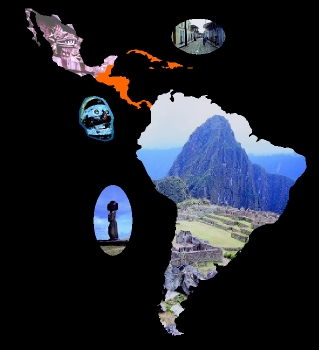Latin@
Covers everything from challenging the legitimacy of the border with Mexico and farm-worker rights to the struggles of the diaspora from Central and Latin America.
Subcollections
-
Chuy Varela Collection
This collection contains public affairs programs and materials produced by Jesse "Chuy" Varela, primarily his work on KFPA 94.1 in Berkeley. -
“Pajaro Latino” Programs produced by Jorge Herrera
This collection contains more than 20 years of Spanish language programs and interviews produced by Jorge Herrera on KPOO-89.5 FM in San Francisco.
Documents
James Baldwin speaking about collective movements, what it means to be an American, early American history, the slave trade, and what it means to be an African American in the United States.
Question and Answers from audience.
Representatives from Chiapas spoke about the land issues between the Mexican government and the indigenous people as a result of NAFTA and Article 27 of Mexico's Constitution. The Ecuadorian representatives focused on the exploitation of the Amazon Rainforest and it's negative effects on their people. In both counties, the indigenous people are frustrated because they are not included in these land decisions that have social, environmental and economic impact on their communities.
Interview with Elizabeth Martinez in 1992 about her book "500 Years of Chicano History". Themes are "what is Chicano?" and positive images of Chicanos.
This is a recording from the 20th Anniversary of the Native American takeover of Alcatraz. Chuy Varela interviews various people at this event on their perspectives of this non-traditional Thanksgiving event and the continued Native American struggle. Also includes Native American prayers, chants and flute music.
Interviews with gang members, mothers of gang members, and police. Discussion about why urban poor youth join gangs, gang life and culture, crime, attempts at peace making, how to be someone other than a gangster, and feeling of powerlessness.
High school student walkout leaders at Dolores Park, SF demand more support for student clubs, bilingual education, and ethnic studies. Speakers include Erica Martinez, International Studies Academy; Carmen Munoz, Immaculate Conception Academy; Ellena Royal, International Studies Academy
Workers demand Levis to stop sending jobs overseas, monetary compensation from Levis for loss of jobs, and to meet Levis' Chief Executive director Bob Haus.
Discussion about Boxer's bill to send the National Guard to aid in increasing border security along the Mexican/U.S. border.
Call Number: CV 061BFormat: Cass BProducers: MOCA, Sushi GalleryProgram: MOCA Territory of Art IICollection: Chuy Varela Collection
Radio performance by Guillermo Gomez-Peña and David Schein in 1986 for public radio. Mexican and US narratives on borders and crossing borders. San Diego and Tijuana, US and Canada are compared.
Call Number: CV 062Format: Cass A & BProducers: KPFAProgram: Noticiero AhoraCollection: Chuy Varela Collection
Chuy Varela interviews El Salvador elections observers Lynn Haug and Elaine Ellinson in 1994. They discuss the transition from civil war to the electoral process, and continued instances of voter fraud and intimidation. Verela also interviews UCLA professor Raul Hinojosa about the upcoming elections in Mexico and the assasination of Luis Donaldo Colosio. Much of the tape is an R&B mix.


